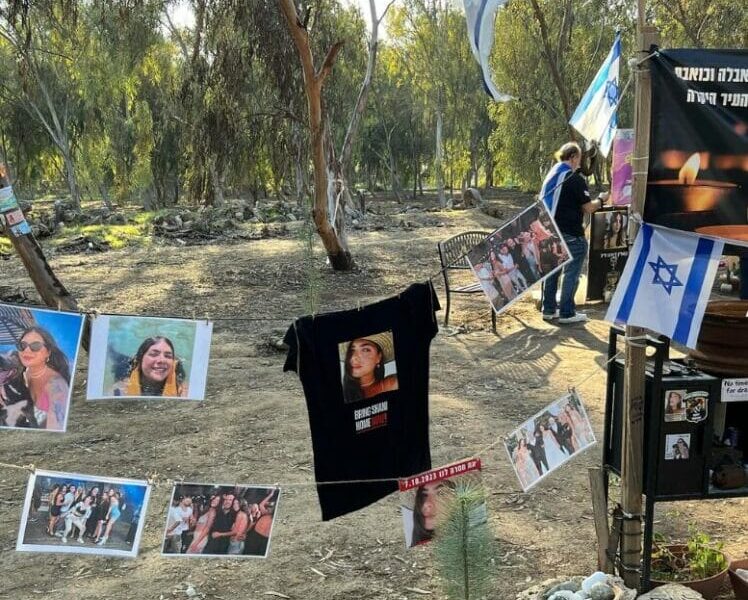One day after his 76th birthday, the dean of Israeli satire, Moti Kirshenbaum, died suddenly of a heart attack. This column is dedicated to him – not only for his groundbreaking role in introducing political satire into Israeli society and creating Israeli television, but for his long, exceptional and diverse career that became, as one of his many colleagues wrote, “the script of the drama that is Israel over the last 45 years.”
Satirists who serve as co-hosts/analysts of daily and often controversial news analysis programs are rarely figures of universal popularity, especially in a country as polarized as Israel. Moti filled that role from 2003 until the day he died, literally minutes before he was to go on the air for his weekly radio sports segment (sports was one of Moti’s passions). Yet in the hours and days following his shocking death at his home in the small coastal community of Mikhmoret, a consensus about Moti emerged. Eulogies, including those from the prime minister and president, competed for completely justified superlatives. The sadness of people from all social, ethnic and political segments of society was absolutely authentic.
Moti had that extra ingredient that despite his cynicism and criticism, which spared no one, turned him into someone whom absolutely everyone seemed to love. Columnist Ben Caspit described this love: “(Moti) … had a kind of nonchalant Israeli familiarity that made him the ultimate sachbak” (Hebrew slang taken from an Arabic word literally meaning your friend, and used to express someone who displays camaraderie, chumminess, folksiness, etc.).
He was a sachbak even though in his essence, he was a biting satirist, an outspoken journalist and a sometimes rough around the edges, always no-holds-barred commentator. In my opinion, he was the Israeli hybrid of Norman Lear, Lorne Michaels, Edward R. Murrow and Woody Allen, with a bit of Michael Palin of Monty Python fame rolled in.
Moti was born in 1939 in Kfar Saba to Polish immigrants, who were able to acquire British mandate immigration certificates to enter British-controlled, pre-state Israel. He claimed the foundations of his sharp social and political insights came from his childhood. He described his hardworking father, who peddled shoes, as someone whose entire life consisted of buying goods for a little and selling them for a little more in order to survive.
He graduated from the Pardes Hanna Agricultural High School and served in the IDF Nahal unit’s parachute brigade. He went to Los Angeles in 1963 to attend UCLA’s School of Film and Television and work as a stringer for the Yediot Ahronot daily newspaper. As he became known through his part-time writing, he was asked to return to Israel before completing his studies to help establish the Israel Broadcasting Authority, which was the first Israeli television channel. He quickly became one of the most important and influential correspondents and editors at the fledgling station, creating and producing many of the first IBA documentary films.
The Yom Kippur War caught him on sabbatical in New York. Like tens of thousands of others, he boarded the first plane back. Hours after landing he was in the Golan Heights with a cameraman filing some of the most dramatic, daring and heart-wrenching footage gathered throughout the war. His ability to translate the trauma into reports that a shocked and stunned nation could absorb prompted the director-general of the IBA to ask him to become chief editor of the nightly news, which was in complete disarray due to the war.
After rehabilitating the department and creating a dynamic and modern news operation, Moti began the phase in his career that built his persona. His creative abilities allowed him to channel the trauma of the war and his massive disillusionment into the creation of “Nikui Rosh” (literally translated as “a head cleaning”), the first satirical program ever produced in Israel. First broadcast in 1974, the series immediately generated immense interest and controversy. Prior to “Nikui Rosh,” mainstream dissent against the government line – whether political, social or cultural – simply did not happen. Our leaders were considered almost infallible, and any critique was considered to be motivated by personal or political interests. The aftermath of the war shattered that illusion. As the writer, creator and director of the show, he gathered a young and fairly anonymous group of actors including Rivka Michaeli, Tuvia Tzafrir, Dubi Gal and the late Sefi Rivlin, who rode the success of the program to become some of the most popular stars of Israeli entertainment for decades to come. His “Saturday Night Live” type of format of sketches radically and permanently changed Israeli humor.
The program filled the void created by the dissonance between the government line and post-war reality. As pre-war ideas were shattered, the different dialogue of “Nikui Rosh” achieved an impact far beyond simply a fresh, entertaining and humorous weekly show. Golda Meir, Yitzhak Rabin and others openly criticized the program, cementing its iconic status. Since IBA was the only television channel at that time, anything broadcast on the channel was seen by virtually the entire population. (A program like this funded, produced and broadcast on state-owned TV is a sign of Israel’s true democratic nature, and a freedom I hope will not be limited in the future.)
In 1976 “Nikui Rosh” won the Israel Award for television, cinema and radio, the highest honor given for such a program. The program enabled Moti to express his sharp wit and tongue through his ability to construct short and ironic moments that contained everything that is good and bad here. He had a unique insight and talent to conceive and implement a concise satirical vision far more significant than the pompous political statements that previously dominated the public domain. Feeling that the program had achieved its aim, Moti moved on. Throughout the ’80s he continued working at the IBA while also continuing to work independently on other projects. His weekly IBA segments were humorous, poignant and precise diagnoses of the country, its diverse people, unexpected landscape and surprising wildlife (nature was another of his passions). His Friday night news program was the most highly watched of the week.
In 1993 Moti was asked by the late Shulamit Aloni, who was then education minister with responsibility for the IBA, to return as director-general. The IBA had become a bloated state-owned bureaucracy and was once again in disarray. It was unable to compete following the introduction of rival commercial Channel Two and Cable TV in 1991.
It was at this time, during my tenure as CEO of the Sports Channel, that I met Moti for the first time. Meetings with him were memorable. His booming voice, complete lack of formality, professional insights and love of sports – but mostly his dry, understated, self-deprecating sense of humor – had us holding our sides. He made it a pleasure to travel to Jerusalem and enter the obsolete and somewhat depressing labyrinth of the IBA building. In 1997 Kirshenbaum’s IBA tenure ended. He continued to write, produce and direct. With the establishment of the new commercial Channel 10 in 2003, Moti and IBA veteran Yaron London, a talented and intellectually brilliant presenter and writer, launched the daily news analysis program aptly titled, “London and Kirshenbaum.” These two respected village elders, who complemented each other completely, gave a perfect platform for those who already knew and loved Moti and for a whole new generation to be exposed to his gifts.
Over the years, I occasionally saw Moti, but I felt like I was in constant contact with him because wherever I was – in the office, at home, travelling – I always made it a point to watch the program, either live at 6 pm, the repeat at midnight or on-demand on my computer. It gave me a true, direct and witty understanding not only of the day’s news, but of our situation in general, which no matter how bad, Moti knew how to convey in a warm, informal, non-patronizing and of course humorous way. He allowed you to get the perspective necessary to be able to sleep at night, just like a father tries to not to hide reality from his children, but who packages it in a way that gives perspective and hope. If you understand any Hebrew, it is worth viewing segments from the program on YouTube to see how zany, off-the-wall, brash and facetious two 70+ presenters can be, while still offering an in-depth and very serious news show. Without a doubt, “London and Kirshenbaum” was the closest thing Israel had to Jon Stewart’s “The Daily Show.” The contrast between London’s animated, emotional antics and Kirshenbaum’s stoic, sphinx-like posturing was the mainstay of the program. Channel 10’s political correspondent Nadav Perry, who regularly appeared on the show, called his tribute to Moti “A Song of Praise to Sanity.” He wrote, “Moti had seen it all. The young ‘kids’ in the studio would get all excited about the latest coalition crisis or statement by Iran’s supreme leader. Yaron would scream or get angry at the latest scandal or of the insensitivity and stupidity of the government, and Moti was just there. His left hand perched on the handle of his chair, watching from the side, his eyes half open. When the drama would reach its peak, everyone would look over at Moti who would summarize everything in one short and ironic sentence that would cause everyone to crack up and would be the only thing that anyone would remember from the item.”
In addition to the program, Moti owned a production company with his three sons and continued to produce award-winning documentaries, travelling the globe to remote locations such as Antarctica, South Sudan and the Caucuses to portray these locations in the unique way only he could. He travelled throughout Africa to produce a series of wildlife documentaries about some of the most intriguing and endangered species of wildlife.
Ben Caspit described the unique angle that Moti brought to his wildlife documentaries: “Moti’s love of wildlife thrilled me each time anew. His ability to humanize a zebra, or a gnu or a gorilla, to crack a joke in its presence, was wondrous.” At the time of his death, Moti was in the production process of a new documentary filmed in South America.
Of all the sad and mournful eulogies, the two that resonated most deeply were from his loving grandchildren and his sidekick, Yaron London, who said, “I have never had a relationship with anyone like I had with Moti. I will never have a relationship for the rest of my life like I had with Moti. We knew what each other was thinking, we could complete the sentences of the other. The dynamic, both on-screen and off-screen continued to grow from day-to-day. I feel blessed to have had such a relationship, but I feel lost without it. I have lost my brother. It hurts. I am alone.”
More than anyone, London knew what made Moti tick: “He loved his people, his country, its nature and although he was not evil, he showed no mercy to those who tarnished the beauty of Israel and what it should be… In these moments, the humorous banter in the studio comes back to my mind. The PA’s would joke that they better know how to administer emergency care in case one of us croaks in the studio, or how the younger talent would ask us when we were planning on vacating the presenters chairs. Moti would answer, that we will never retire while we are at the top. We will only leave on a stretcher.”
Just like loved ones who die suddenly and create an overwhelming vacuum, Moti Kirshenbaum left this world while he was a daily part of my life, until the last moment of his life. He was the ultimate storyteller of Israeli society. His satirical sense of humor and intellectual courage also made him one of the main pillars of Israeli journalism. No matter how bad the situation or the event, as long as Moti was around and commenting on events, things seemed to be under control. You could depend on Moti, but he left without saying goodbye. I have no doubt that is precisely the way he wanted it. He died doing what he loved, entertaining and educating us in his own special way. He was the last person who would have willingly retired. He wouldn’t have been able to stand all of the praise.
He is sorely missed.






